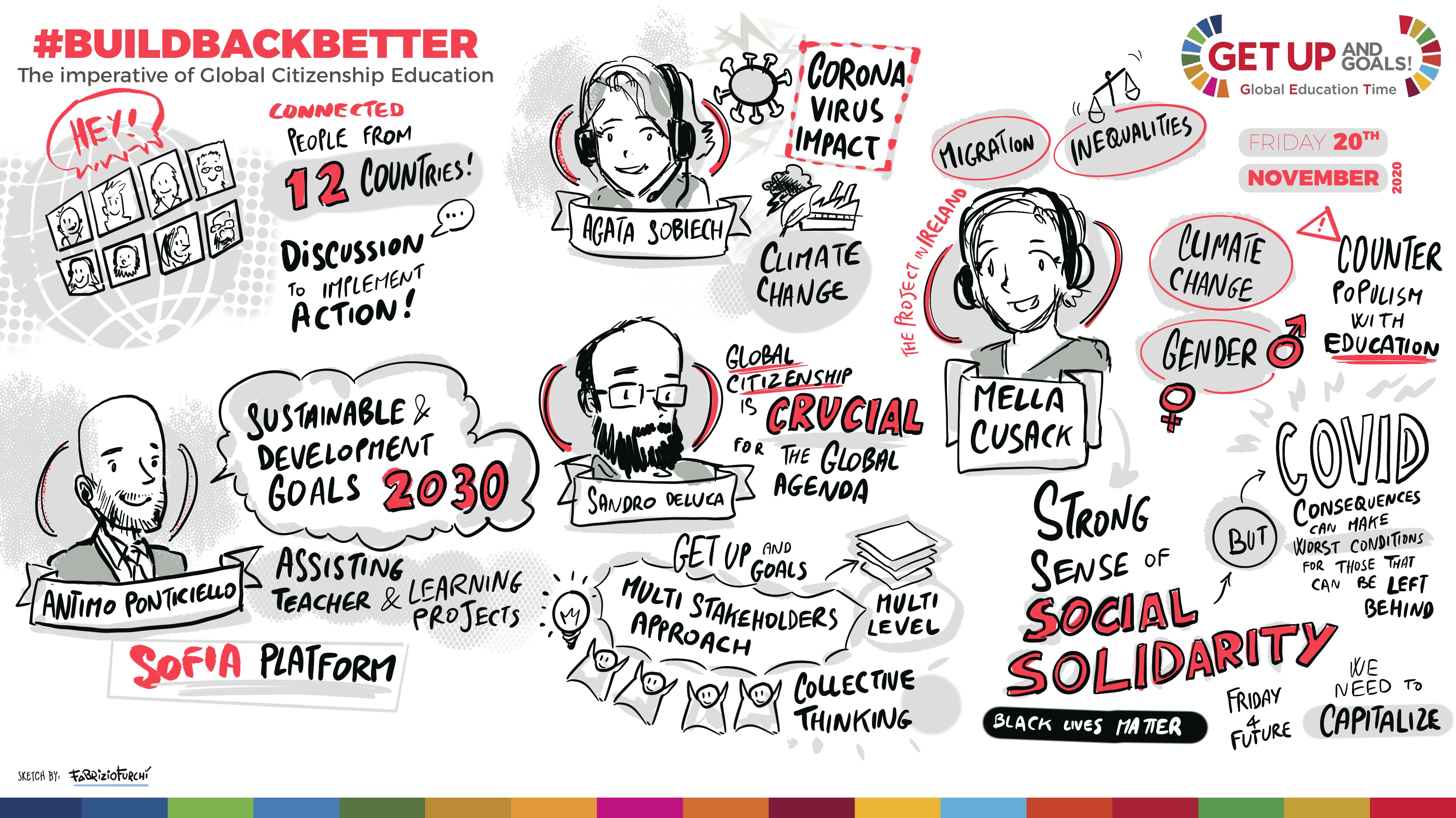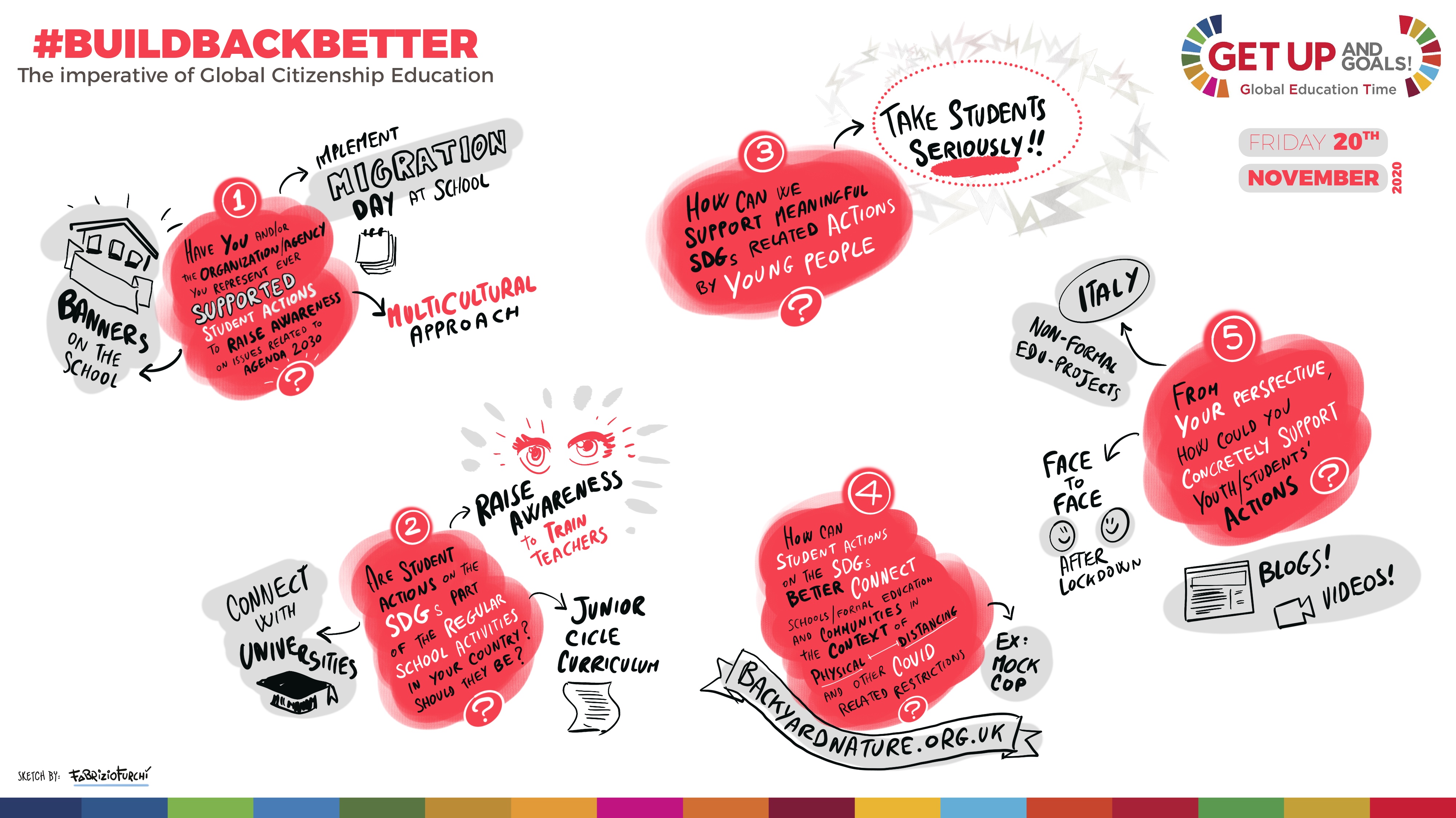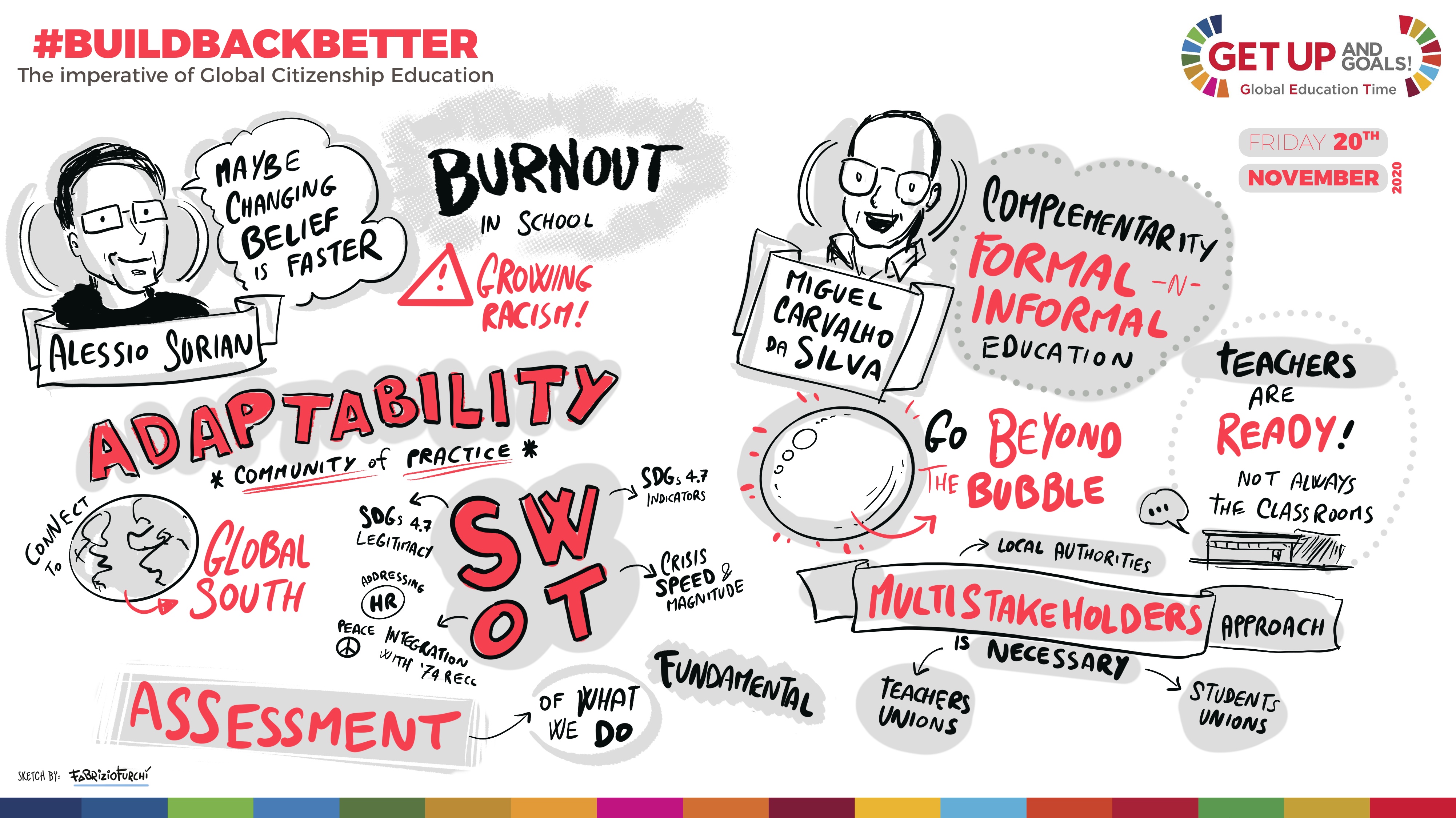On November 20th, 2020 the final international multistakeholder seminar of GET UP AND GOALS! has taken place. The virtual event was attended by 80+ representatives of Ministries, Local Authorities, International Organizations, Universities, Research Centres, CSOs, from 13 countries, in Europe and beyond, all gathered with the aim to collectively identify concrete ways forward, next steps, actions, commitments to bring SDGs and Global Citizenship Education (GCE) to schools and to better face the current educational challenges, highlighted by the pandemic situation.
OPENING REMARKS
Opening remarks saw speeches by the General Director Antimo Ponticiello of the Italian Ministry of Education, Agata Sobiech the European Commission (DEAR - Development Education and Awareness Raising) and Sandro De Luca director of CISP (Comitato Internazionale per lo Sviluppo dei Popoli, the organisation acting as the general coordinator of the project.
REALITY CHECK ANALYSIS
Soon after, a 2020 “reality check” was presented by Mella Cusack of APA: first of all, an analysis of the macro environment to identify the external Political, Economic, Social, Technological, Legal and Environmental factors impacting our work. Then, an analysis of the Strengths, Weaknesses, Opportunities and Threats of Global Citizenship Education (GCE) / Development Education (DE) (in general terms and within that framework), and of the GET UP AND GOALS! project activities, in light of the current pandemic situation.
DOWNLOAD
2020 Realiy Check_Pestle and SWOT analysis Get Up and Goals!
POLL
A poll was launched to collect the participants’ view on their environment with regards to GCE. Results showed that the majority of the participants perceive that, in their country:
- Government policies and strategies to the integration of GCE in schools, are somewhat supportive
- Educators are somewhat interested in Global Citizenship Education
- Institutions (Ministries, Local Authorities, Universities, Research Centres) are somewhat interested in Global Citizenship Education
- And, last but not least, Global Citizenship Education is not very embedded/somewhat embedded (almost equal results) in formal education curriculum and Assessment
A “somewhat” situation which confirms the work that remains to be done to reach target 4.7 of the 2030 Agenda at European level.
WORKING GROUPS
Then, designed on the basis of concrete actions, results and guiding questions of the GET UP AND GOALS!project, came the heart of the seminar: three Working Groups attended by all participants.
Group ONE - Global learning, formal education and youth activism: strategies for connections
The participants discussed the following questions: How do we facilitate the active engagement of our students? Is it possible to do so in the context of a pandemic with all that has come to mean in terms of physical restriction? How can we involve local and national communities in this process?
DOWNLOAD
PRESENTATION Wks.1 Student action
Workshop 1 (Student actions) group discussions
Group TWO - Sustainable and Global Schools: strategies and tools to assess GCE in schools
The participants discussed the following questions: How can we monitor progress, assess and share the results of GCE interventions in schools? How can we continuously learn from what we do? New teaching resources: which strategies to encourage the adoption of SDG-oriented teaching materials?
DOWNLOAD
PRESENTATION Wks.2 GCE Impact Assessment
Workshop 2 ( GCE Impact Assessment) group discussions
Group THREE - New teaching resources: strategies to encourage the adoption of SDG-orientated teaching materials
The participants discussed the following guiding questions: What are the main challenges for GCE in formal education, particularly in the context of the current global situation? How can we overcome these challenges? How can we enhance the use of GCE teaching resources? How can we ensure that teachers’ professional development interventions are effective?
DOWNLOAD
PRESENTATION Wks.3 New teaching resources
Workshop 3 (New teaching resources) group discussions
Facilitated by the GET UP AND GOALS! Team, each group brought up very concrete and interesting proposals, approaches, strategies, ideas, steps forward, reflections and attention points, a real stimulus for the work of us all.
FINAL REMARKS
Final remarks by Alessio Surian from University of Padua and Miguel Carvalho da Silva from North South Center of the Council of Europe, helped all participants to better focus on challenges and steps forward to better embed Global Citizenship Education in formal education and to improve its quality.
Alessio Surian offered three important triggers: the first one was about considering the Covid-19 emergency as "syndemic”. The very fact of focusing also on socio-economic factors and structural conditions affecting (sectors of) the population has generated a transnational perspective that links cultural, environmental, economic factors and social justice. The second one: Comprehensive Global Education framework. It seems urgent to address school institutions, teachers, students and local communities with a co-ordinated “offer” concerning “values” / “global” educations – one that offers a sound methodological approach and does not tear apart one global theme from another. The third one: Cross-cultural and Southern epistemologies and partnerships. Surian remarked the importance of the partnership element, both in terms of partners and scholars based in the Global South and of local European population strongly linked with it, in GCE tools and debate.
On the other hand, Miguel Carvalho da Silva pointed out that despite a good wealth of pedagogical resources that beneficiates from non-formal education methodologies and conceptual approaches, the formal educational settings and curricula are not fit (excessive bureaucratic/reporting work, program load or classroom size hinder formal educators' pedagogical role).
Getting through this obstacle requires i) an increased multistakeholder communication and working channels efficacity between CSOs, practitioners and policymakers; iii) a whole school approach introducing a bottom-up approach based on non-formal participatory methodologies building on the link between local daily-life reality and global issues.
Breaking down the boarders between the different sectors/actors in formal education (academia, pre and in-service teacher training structures, and related ministries) privileging intra and inter sectorial continuous (all year-round) coordination.
DOWNLOAD
Surian and Silva Final Remarks
Watch below our GRAPHIC HARVESTING and the VIDEO RECORDING of the event







